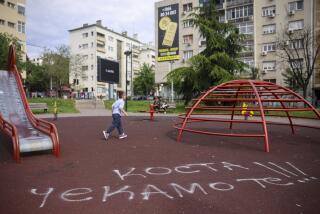Muslims, Croats Incite Violence, Serbs Charge : Yugoslavia: Stage is set for possible assault on breakaway Bosnia. Call-up of reserves is reported.
- Share via
BELGRADE, Yugoslavia — Serbia’s state-controlled media Thursday accused Muslims and Croats of provoking violence in neighboring Bosnia-Herzegovina, ominously setting the stage for what could be a full-scale assault on the breakaway republic.
The Serbian-led federal army has mobilized large numbers of reservists over the last two days, according to the unofficial Studio B broadcast network and sources in Belgrade who said friends and relatives were being called up.
The moves follow a warning by Yugoslav Defense Minister Blagoje Adzic, a hard-line nationalist Serb, that independence for Bosnia-Herzegovina has sent the fractured Balkan federation “knocking at the gates of hell.”
European Community nations and the United States this week extended diplomatic relations to Bosnia-Herzegovina, officially recognizing its independence.
Serbian vigilantes opposed to Bosnian secession have sealed off access to the capital, Sarajevo, and erected heavily armed barricades around huge areas of the republic now under their control.
Belgrade television reported that Serbian irregulars have “liberated” the historic old city of Mostar as well as the Drina River town of Zvornik, which has been the scene of clashes for the past three days.
The Serbian guerrilla operations followed a declaration by Bosnian President Alija Izetbegovic, a Muslim, that he was imposing a state of emergency and assuming special wartime powers in an attempt to deter the outbreak of civil war.
There has been little reliable information reaching this Serbian and Yugoslav capital about the tense situation in Bosnia-Herzegovina as telephone communication with Sarajevo has been repeatedly interrupted and Belgrade-based media--instruments of Serbia’s Communist president, Slobodan Milosevic--have taken a decidedly pro-Serbian slant.
Sarajevo was reported to be quiet after three days of sniper fire and shelling.
The Tanjug news agency accused “Muslim and Croatian extremists” of attacking army positions around Mostar, which it said forced the army to attack the city in self-defense.
Mostar, once a favorite tourist destination because of its picturesque Turkish Bridge and narrow cobblestone streets, is a predominantly Muslim city but is surrounded by Croatian communities that have been a wellspring of ethnic extremism this century. Some of the worst atrocities of World War II were committed in the desolate Neretva River Valley that runs south of the city to the Adriatic Sea.
Alleging that Croatian forces had again committed atrocities, Belgrade television showed the mutilated bodies of Serbs said to have been found in the Croatian stronghold of Kupres, about 50 miles west of Sarajevo, after it was taken by the army on Tuesday.
Tanjug reported that shells and rifle fire had reached Serbian territory across the Drina River from Zvornik, which has been under the control of armed Serbian insurgents since last weekend.
The media accusations against Muslims and Croats and the reported mobilization moves raised fears that the army and Serbian insurgents might be preparing a major military strike at the republic.
However, it remained unclear whether the federal army had either the intention or the strength to launch another costly war.
Hard-line Communist generals, like Adzic, have backed Milosevic in his drive to unite all Serbs in a new Yugoslav federation that would be composed of Serbia, Montenegro and Serbian-inhabited regions seized from Croatia and Bosnia-Herzegovina.
But the army suffered huge losses in last year’s battles to take territory from Croatia, and the war effort has been consuming about 90% of Serbia’s budget and contributing to a hyper-inflationary spiral now estimated at an annual rate of 100,000%. Some army units also appear to be protecting the general population from the rebel attacks.
Western diplomats in Belgrade said their governments are closely observing the Bosnian conflict.
“We see the impetus for most of this coming from this direction,” said one envoy, referring to the Serbian leadership in Belgrade. “We’re still in the process of trying to decide what to do about it or say about it.”
More to Read
Sign up for Essential California
The most important California stories and recommendations in your inbox every morning.
You may occasionally receive promotional content from the Los Angeles Times.














